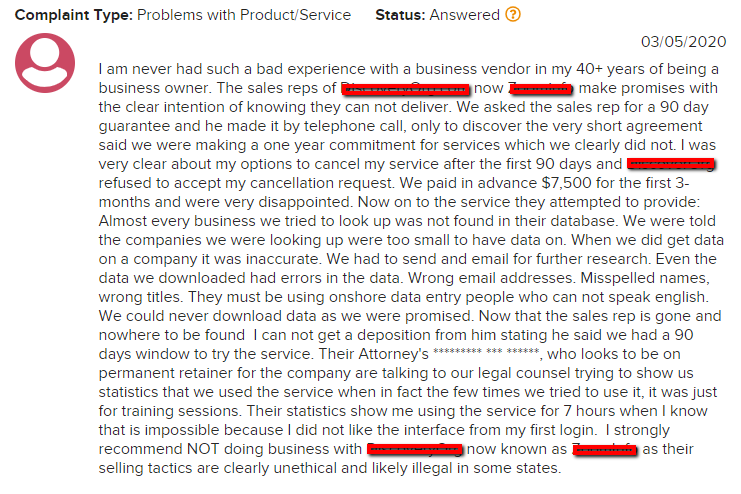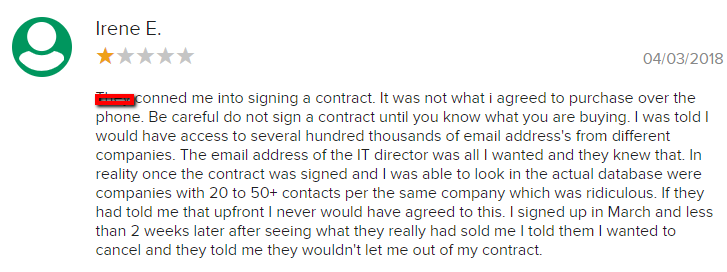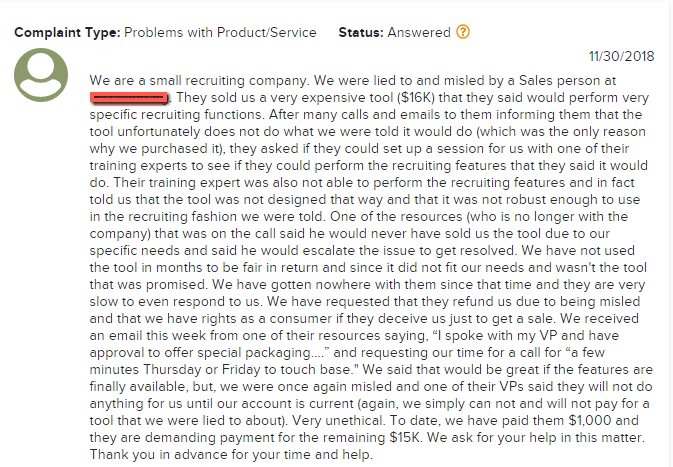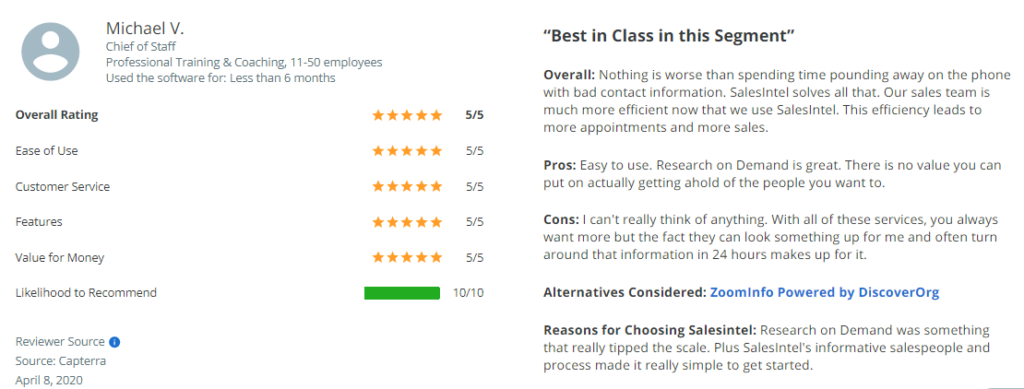There are two things that you might consider while choosing a data partner – 1) Data Quality and 2) Brand Recognition. Some businesses might choose data quality over the brand while some might trust the brand name without focusing much on the data quality. The reality though is that too many customers conflate brand recognition with quality and reliability. Just because a brand has more recognition it doesn’t always translate into a higher quality product.
Let’s dive deeper into each aspect that you should consider before choosing a data partner.
Look Beyond the Brand Name
While there is generally a reason why a certain brand has come to be widely recognized in an industry it’s a mistake to assume that the reason for that is the quality of their product. Many times it comes down to financial backing, marketing tactics, timing, and even sheer luck. For all of these reasons, it’s vital to not just take a brand at their word simply because they are the most well-known solution.
Don’t let yourself get taken in by marketing claims. You need to look beyond the brand name and check the data quality yourself, request a coverage report for your ideal customer profile, research customer reviews, confirm features like integrations, etc. Additionally, you should also review complaint sites like the BBB and look for patterns of complaints and how the data provider handles them.
There are many instances where clients trusted an established data provider but were disappointed with the data quality and customer service once they started using it.

Adding insult to injury, many of these customers not only found that the data quality and coverage wasn’t what they had been led to expect, but they were now stuck in an expensive contract that auto-renewed on them unexpectedly and had astronomical termination fees.

Remember, the only opinions that count are those of customers. Customer reviews and complaints can give you a clear picture of what you can expect in terms of data quality and customer service.
The Unforeseen Risks of Compromising with Data Quality
Using inaccurate data for prospecting and to support lead generation efforts can jeopardize your entire pipeline. Sales reps can end up targeting the wrong account, reaching out to the wrong decision-makers, dialing bad numbers, and sending emails that bounce. There are countless unforeseen risks associated with poor data quality that can hurt your business.
- The Risk to Campaign ROI: The obvious risk of inaccurate data is the success of your outbound campaigns. When you calculate ROI for your campaigns, you assume that the data your team will use is accurate and you will have sufficient coverage to feed the campaign the volume at the top of the funnel it needs. When you have inaccurate, incomplete, or limited data coverage, the actual results will underperform what you predicted.
- The Risk to Sales Forecasts: Sales and marketers leaders use data as a baseline for their lead generation efforts and sales forecasts. To be precise, 42% of B2B marketers state the lack of accurate data is one of their biggest obstacles to their lead generation.
Poor data impacts sales projections by calling into question lead count and expected conversion rates. You prepare your sales engine to act on targeted prospects from the data and convey your plans and projections to your team based on the data available. If you expect 20% of the prospects will convert into a lead, but 10% of the list never received the email, they will not reach their goals.
- The Risk to Sales Team Efficiencies: If your team does not have accurate data to work on, it hurts their productivity and efficiency. Inaccurate data wastes on average 27.3% of sales reps’ time. That’s approximately 546 working hours per rep, per year. Additionally, duplicates in your CRM data might get assigned to two sales reps, or inaccuracies in data can make it impossible to connect with prospects.
- Risk to Revenue: All your efforts, successful and unsuccessful, will reflect in your revenue. Put simply, poor data will result in a loss of revenue. How?
Inaccurate data used at any stage of the sales process or your sales funnel will result in lower engagement, lower performance, and lower sales. In fact, 88% of businesses have had bad data have a direct impact on their bottom line. Bad CRM data filled with inaccuracies will lead to losing money on every outbound initiative.
Poor data quality hinders your ability to utilize insights effectively and drains valuable resources. Thus, you cannot afford to consider data quality as an afterthought.
Take a Data-First Approach
In a highly competitive business environment, every business understands that data is the key to winning more deals. Quality data helps businesses understand their customers and improve engagement throughout the sales process. Data plays a vital role at different levels. Let’s take a brief look at some of the functions where data quality can make a huge difference.
- Decision-Making: The better the quality of the data, the more confidence you will have in the efforts your team makes. Using accurate data lowers the risks of unforced errors and opens the door to higher performance across your team. So when data is accurate, guesswork and risk in decision-making can be greatly reduced.
- Productivity: As discussed earlier, accurate data makes sales reps more efficient. Instead of spending time validating and correcting data errors, calling switchboards or incorrect numbers, and having their emails bounce, they can focus on their core mission, having conversations that lead to won deals.
- Marketing: Better data enables more accurate targeting and communications, especially in the omnichannel environments many organizations are striving towards. Inaccurate data can be particularly deadly for marketers. Sending emails with high bounce rates is the quickest way to jeopardize your account with your email service provider and will destroy your domain reputation which can decimate your email marketing for months.
- Compliance: Maintaining data quality is crucial because of compliance-related issues. Data regulations and compliance are constantly evolving. As a result, it is increasingly important that companies manage their data properly. It is difficult to demonstrate compliance if your data is not accurate or is poorly maintained. Data quality becomes even more vital when you have sensitive personal data.
It’s clear that your priority should be data quality instead of choosing a big brand that fails to deliver quality data. However, to determine the quality of a vendor’s data, you need to understand a few quality dimensions.
Six Data Quality Dimensions to Check With Your Data Partner
It is a fact that expecting 100% data accuracy is unrealistic. If so, then what does “high quality” mean? In order to determine the accuracy and reliability of a vendor’s data across six quality dimensions:
1. Timeliness
Timely data comes from up-to-date sources. Access to the most recent data offers valuable insights that meet business objectives.
2. Completeness
Complete data records are those where all required attributes are available. A complete data source ensures that all the data points such as a person’s name, title, email, phone number and other contact details along with the technographic and firmographic data for the company are covered.
3. Consistency
Data inconsistency is a concern, especially when data is aggregated from multiple sources. Differences in data can result in inaccurate, unreliable datasets. Data consistency ensures that there is no missing data in the fields that allow your team to manage and use the data seamlessly. Also, make sure that the data is reliably named/tagged and that you have an understanding of what exactly is represented in the fields they provide. You may find that your assumptions are incorrect.
4. Relevance
There’s no point in using data that doesn’t match with your ideal target audience. Relevant data directly relates to the analysis being performed. Adding a slew of data into your system won’t help your team if it is not relevant. Pay only for the data that is relevant to your business. The more the data relevancy the more the ROI you will get.
Here’s an example where a recruiting company struggled to get the relevant contacts.

5. Uniqueness
There are data providers who will show sparkling numbers in terms of data quantity. However, not all of the entries are unique.
A prominent publicly traded data provider has a huge amount of data that they cite. However, the data is an amalgamation of several data providers as they acquired and combined data from multiple acquired data providers. As a result, overlaps between their data and struggles merging databases creates a lot of redundancies. So, they may have huge numbers in terms of record counts However, the number comes down considerably if you consider unique data entries. When compared with SalesIntel it’s clear that simply more records does not necessarily mean more value.
6. Accuracy
This one almost goes without saying but the data has to be accurate. Otherwise, there is no reason for you to trust your segmentation or to have faith in your outreach. And unreliable data turns into a vicious cycle. The less trust reps have in the data, the less they utilize it. And unused data means no ROI on your investment.
Most data providers offer data that lacks human verification. They rely on AI and machine learning to verify their data. For instance, if the machine knows that the email address of a person at a specific company is FirstName.LastName@CompanyName.com, it will generate entries of other email addresses it doesn’t have from the same company by following the same pattern. However, this and similar shortcuts are not always reliable tactics.
To ensure data accuracy, SalesIntel’s data goes through human-verification where actual researchers hand verify every record. Additionally, to ensure that our data remains fresh and updated, our data goes through a human re-verification process every 90 days.

Bigger is Not Always Better
When all is said and done, it is never about adding a big brand as your data partner. It is about partnering with a reliable data provider who can deliver the accurate data you need to power your sales and marketing campaigns.





